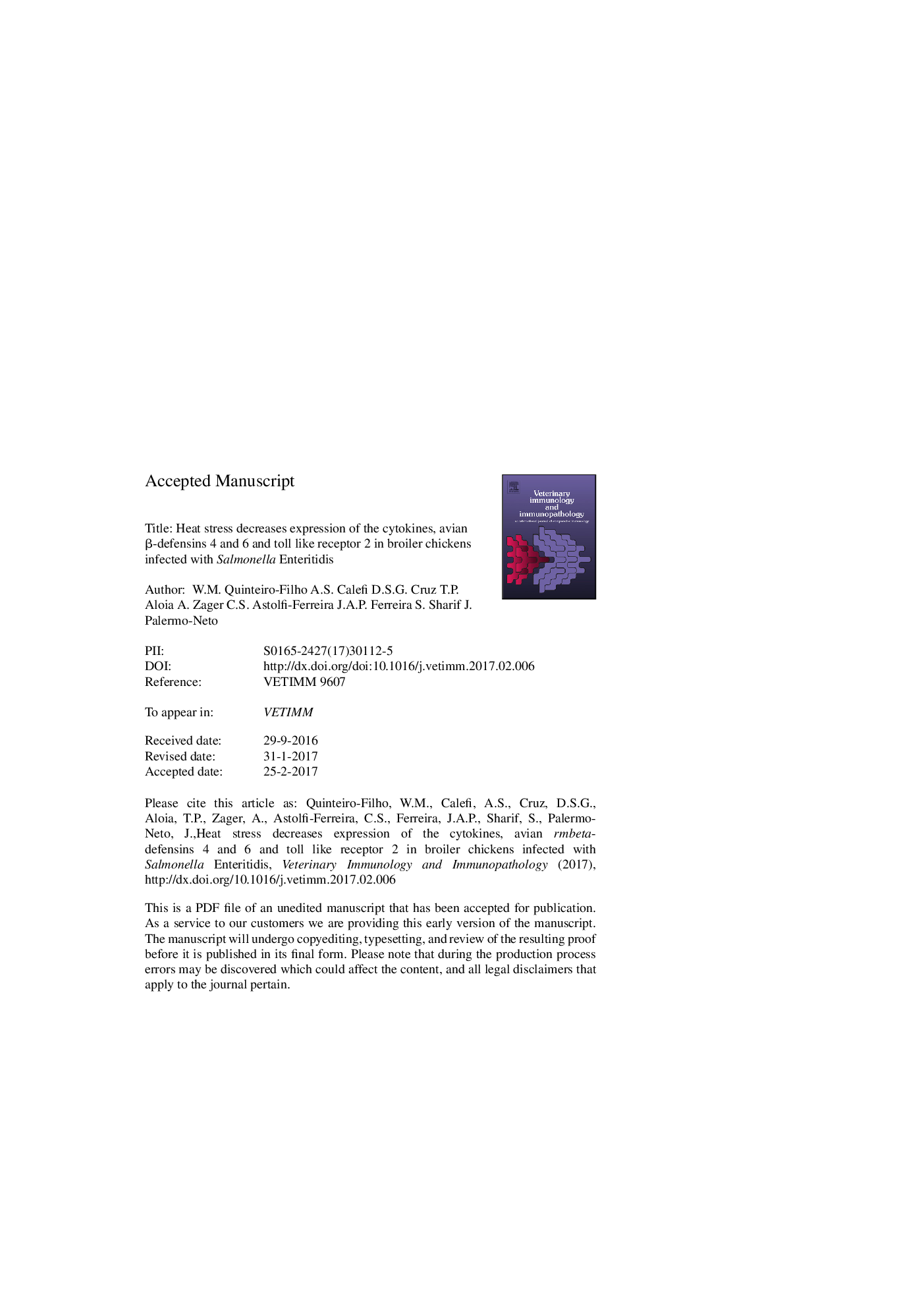| کد مقاله | کد نشریه | سال انتشار | مقاله انگلیسی | نسخه تمام متن |
|---|---|---|---|---|
| 5544746 | 1554998 | 2017 | 30 صفحه PDF | دانلود رایگان |
عنوان انگلیسی مقاله ISI
Heat stress decreases expression of the cytokines, avian β-defensins 4 and 6 and Toll-like receptor 2 in broiler chickens infected with Salmonella Enteritidis
دانلود مقاله + سفارش ترجمه
دانلود مقاله ISI انگلیسی
رایگان برای ایرانیان
کلمات کلیدی
موضوعات مرتبط
علوم زیستی و بیوفناوری
علوم کشاورزی و بیولوژیک
علوم دامی و جانورشناسی
پیش نمایش صفحه اول مقاله

چکیده انگلیسی
A high ambient temperature is a highly relevant stressor in poultry production. Heat stress (HS) has been reported to reduce animal welfare, performance indices and increase Salmonella susceptibility. Salmonella spp. are major zoonotic pathogen that cause over 1 billion of human infections worldwide annually. Therefore, the current study was designed to analyze the effect of heat stress on Salmonella infection in chickens through modulation of the immune responses. Salmonella Enteritidis was inoculated via gavage at one day of age (106 cfu/mL). Heat stress 31 ± 1 °C was applied from 35 to 41 days of age. Broiler chickens were divided into the following groups of 12 chickens: control (C); heat stress (HS31 °C); S. Enteritidis positive control (PC); and S. Enteritidis + heat stress (PHS31 °C). We observed that heat stress increased corticosterone serum levels. Concomitantly heat stress decreased (1) the IgA and IFN-γ plasmatic levels; (2) the mRNA expression of IL-6, IL-12 in spleen and IL-1β, IL-10, TGF-β in cecal tonsils; (3) the mRNA expression of AvBD4 and AvBD6 in cecal tonsils; and (4) the mRNA expression of TLR2 in spleen and cecal tonsils of chickens infected with S. Enteritidis (PHS31 °C group). Heat stress also increased Salmonella colonization in the crop and caecum as well as Salmonella invasion to the spleen, liver and bone marrow, showing a deficiency in the control of S. Enteritidis induced infection. Together, the present data suggested that heat stress activated hypothalamus-pituitary-adrenal (HPA) axis, as observed by the increase in the corticosterone levels, which in turn presumably decreases the immune system activity, leading to an impairment of the intestinal mucosal barrier and increasing chicken susceptibility to the invasion of different organs by S. Enteritidis .
ناشر
Database: Elsevier - ScienceDirect (ساینس دایرکت)
Journal: Veterinary Immunology and Immunopathology - Volume 186, April 2017, Pages 19-28
Journal: Veterinary Immunology and Immunopathology - Volume 186, April 2017, Pages 19-28
نویسندگان
W.M. Quinteiro-Filho, A.S. Calefi, D.S.G. Cruz, T.P.A. Aloia, A. Zager, C.S. Astolfi-Ferreira, J.A. Piantino Ferreira, S. Sharif, J. Palermo-Neto,